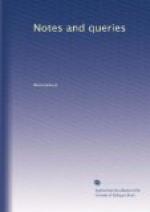It does not appear that any present was made to the Countess in return. As in the case of Archbishop Laud and Master Prynne (Vol. i. p. 405.), these gifts were evidently expressions of condescension and good will by one in a high position to another in a somewhat lower station. It is, I take it, evident that the money-gifts, from the rank in life of the parties, and their connection with the Countess, could have been made with no other meaning or intention.
JAS. CROSBY.
Streatham, April 22. 1850.
* * * * *
FOLK LORE.
Exhumation of a Body ominous to Family of the Deceased.—In the counties of Leicester and Northampton, and I doubt not in other parts of England, there is a superstitious idea that the removal or exhumation of a body after interment bodes death or some terrible calamity to the surviving members of the deceased’s family. Turner, in his History of Remarkable Providences, Lond. 1677, p. 77., thus alludes to this superstition:—
“Thomas Fludd of Kent, Esq., told me that it is an old observation which was pressed earnestly to King James I., that he should not remove the Queen of Scots’ body from Northamptonshire, where she was beheaded and interred. For that it always bodes ill to the family when bodies are removed from their graves. For some of the family will die shortly after, as did Prince Henry, and, I think, Queen Anne.”
In the above-named counties, nine roasted mice, three taken each third morning, constitutes the common charm for the hooping-cough.
T.S.
Suffolk Folk Lore.—I send you a few articles on “Folk Lore”, now, or not long ago, current in the county of Suffolk, in addition to what is to be found in the latter part of the second volume of Forby’s Vocabulary of East Anglia.
1. To ascertain whether her pretended lovers really love her or not, the maiden takes an apple-pip, and naming one of her followers, puts the pip in the fire. If it makes a noise in bursting from the heat, it is a proof of love; but if it is consumed without a crack, she is fully satisfied that there is no real regard towards her in the person named.
2. “I remember the wooing of a peascod instead of her.” (Shakesp.)—The efficacy of peascods in the concerns of sweethearts is not yet forgotten among our rustic vulgar. The kitchen-maid, when she shells green peas, never omits, when she finds one having nine peas, to lay it on the lintel of the kitchen door; and the first clown who enters it is infallibly to be her husband, or at least her sweetheart.
3. If you have your clothes mended upon your back, you will be ill spoken of.{5}
4. If you sweep the house with blossomed broom
in May,
Y’re sure to sweep the head
of the house away.
Similar to which is the following:—
5. To sleep in a room with the whitethorn bloom in it during the month of May, will surely be followed by some great misfortune.




